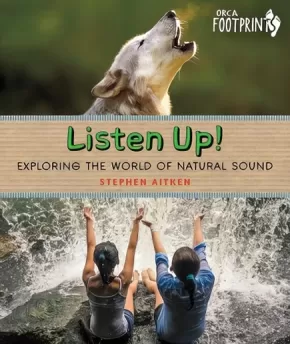Stephen Aitken
Stephen Aitken is a biologist, artist and science writer. After completing an honors biology degree with a minor in fine arts and spending some time at the Carleton School of Architecture, Stephen went on to have a career as a biological illustrator, editor and writer. He has been creating his own children's books for the past 15 years. Stephen's books and articles are inspired by the wonders of the natural world. He is the co-founder and executive secretary of the charity Biodiversity Conservancy International and senior editor of the journal Biodiversity.
Kids Books (2)
Synopsis:
The sounds of nature are being drowned out by the clamor of human activity, and that's not good for people, animals or the environment.
Every living thing emits sound—birds sing, whales whistle, streams burble and trees pop and fizzle. In Listen Up, young readers are introduced to all the sounds of the natural world, from the first Big Bang to the complex soundscapes of the rainforests.
Readers will also discover how the invasion of human sounds, from airplanes, traffic and machines, is threatening the survival of species that have adapted to their habitats over thousands of years. Conserving the sounds of nature is an important part of addressing the biggest challenges facing humanity today—protecting the planet's biodiversity and the future of our natural world.
Reviews
“Engages readers by bringing together a series of interesting facts and ideas related to animal hearing…An intriguing addition to the Orca Footprints series.”— Booklist
Educator & Series Information
Recommended for ages 9 to 12.
This book is part of the Orca Footprint series.
Additional Information
56 pages | 8.00" x 9.50" | Hardcover
Synopsis:
Light pollution threatens the survival of every living species on our planet, including people.
It started when Thomas Edison invented the first light bulb more than 150 years ago. Then, as electric light became more common, light pollution began to take over cities and towns. Today, in urban centers all over the world, the stars in the sky aren't visible. Millions of people have never seen the Milky Way. In Saving the Night, we discover how plants and animals have adapted over millions of years to survive and thrive in the dark, and how artificial light can upset the balance of entire ecosystems. But there are ways we can take back the night for animals, plants and us. It starts with the flick of a switch.
Reviews
“Richly described and alluring…Aitken urges his readers to be unafraid of the dark and after reading this excellent book, tweens will want to venture forth into the night without a flashlight.”— School Library Journal
“Both personal and poetic…A very comprehensive look at the role of light in the natural world and the effect of light pollution on all living organisms. This book deserves to be available and promoted in schools and libraries. Saving the night for all of us is worth it. Highly Recommended.” — CM: Canadian Review of Materials
“[An] informative addition to the Footprints series…This organized, involving book will fill a gap in many library collections.”— Booklist
“Flashes on a too often unconsidered sort of environmental pollution.”— Kirkus Reviews
Educator & Series Information
This book is part of the Orca Footprint series. Kids today inhabit a world full of complex—and often mystifying—environmental issues. Orca Footprints aim to help kids answer their questions about the state of the natural world with well-researched, simply-expressed information and powerful images. With topics such as food production, water, cycling and sustainable energy, these books will inspire kids to take action.
Recommended for ages 9-12.
Additional Information
48 pages | 8.00" x 9.50" | Hardcover







